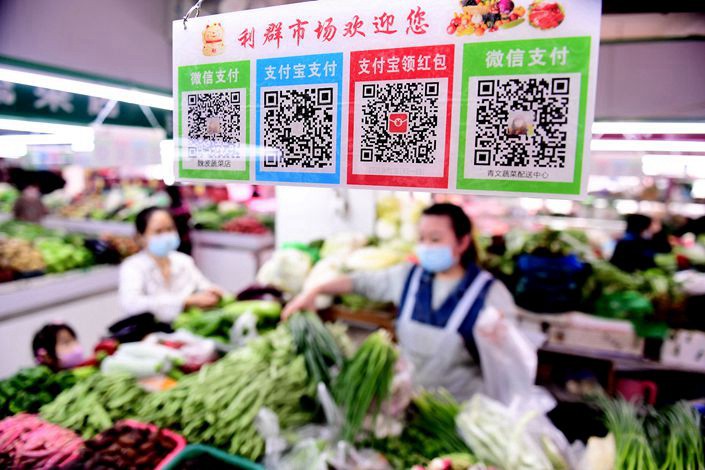Ling Huawei: Ant Group’s Lightning Growth Shows Chinese Regulators Must Get With the Times

Ling Huawei is managing editor of Caixin Media and Caixin Weekly.
“If banks fail to make changes, we will change banks.”
That’s what Jack Ma, founder of Chinese e-commerce giant Alibaba Group Holding Ltd., said in 2008. Today, it seems to have come true.
Since the launch of Alipay, the payment platform created to support transactions on Alibaba’s e-commerce websites, Ant Group has grown into a multi-faceted fintech behemoth. With a broad user base from its dominant third-party payment service, the Alibaba affiliate has swelled to encompass other financial services like online microlending, wealth management and insurance.
Meanwhile, regulators face the knotty problem of how to supervise rapidly growing fintech giants like Ant Group because there are so few precedents.
Ant Group has acquired a wide range of licenses for its financial services, sidestepping the legal risk of operating an unlicensed financial institution. Corresponding regulatory capacity must keep up. Regulators should consider how to effectively supervise these new financial institutions, with the goal of helping them control risks while assessing their impact on China’s financial system.
However, it’s difficult for financial regulators to find a balance between excessive regulation and insufficient supervision. For example, while giving Ant Group an online banking license for MYBank, the banking regulator determined the bank’s strategic positioning of capped deposits and loans. It also required MYBank’s major shareholders to hold no more than a 30% stake each. These restrictions have hindered synergy between Ant Group and its online commercial bank, and have failed to meet Ant Group’s needs for rapid growth.
The situation has been the opposite for Ant Group’s online consumer loan businesses Huabei and Jiebei, which are the main source of the company’s profits. Unlike MYBank, they are not supervised by the China Banking and Insurance Regulatory Commission, but rather by local regulators, whose weaker regulatory capabilities cannot match Ant Group’s size.
These gaps and blind spots in regulatory oversight have led to a similar lack of self-regulation at financial institutions, causing Ant Group to sometimes ignore or even distort the underlying logic of finance. Although Ant Group’s financial businesses remain strong, it has sought to reframe itself as a technology service provider, which I’m afraid is not just aimed at getting a higher “tech company” valuation.
Read more
Cover Story: How Ant Grew Into an Elephant-Sized Behemoth
For example, all of the credit data from Huabei and Jiebei should have been included in the central bank’s credit reporting system to prevent people from running up debts on multiple platforms without the lenders knowing about it. But so far, Ant Group has been reluctant to do so.
More importantly, there is a vast amount of money flowing inside Ant Group’s sprawling business chain that falls outside regulators’ oversight. This largely sidelines the central bank-backed NetsUnion Clearing Corp., which was set up to prevent Alipay and its rival WeChat Pay from establishing their own clearing systems for online transactions.
Valued at $150 billion in its latest fundraising round in 2018, Ant Group is planning a dual listing in Hong Kong and Shanghai. This highly anticipated IPO could be the largest ever, which also means regulators will have a tougher task supervising the company.
Rather than trying to regulate these new financial institutions as if they were traditional banks, regulators should instead try thinking outside the box while maintaining their independent decision-making and implementation capabilities. Most importantly, they need to keep up with the times amid rapid growth of the fintech giants.
This commentary has been edited for length and clarity.
Translated by Luo Meihan
Contact editor Michael Bellart (michaelbellart@caixin.com)
Support quality journalism in China. Subscribe to Caixin Global starting at $0.99.

Ling Huawei is the managing editor of Caixin Media and Caixin Weekly.
- 1Cover Story: China Carves Out a Narrow Path for Offshore Asset Tokenization
- 2Drownings Shake Chinese Enthusiasm for Travel to Russia
- 3Over Half of China’s Provinces Cut Revenue Targets
- 4Li Ka-Shing’s Port Empire Hit by Forced Takeover Amid Panama Legal Dispute
- 5In Depth: China’s Mutual Fund Industry Faces Overhaul After a Banner 2025
- 1Power To The People: Pintec Serves A Booming Consumer Class
- 2Largest hotel group in Europe accepts UnionPay
- 3UnionPay mobile QuickPass debuts in Hong Kong
- 4UnionPay International launches premium catering privilege U Dining Collection
- 5UnionPay International’s U Plan has covered over 1600 stores overseas





